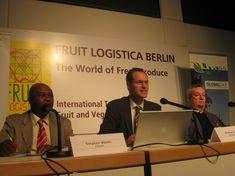
GlobalGAP has stepped up its push for food safety and supply chain communication worldwide with two new partnerships.
The first is with its new Africa observer Dr Stephen Mbithi who, in addition to his role as chief executive of the Fresh Produce Exporters’ Association of Kenya (FPEAK), will participate in all meetings and engage in discussions to give contributions and opinions on the GlobalGAP standard as it stands now, and on proposals for the future.
The goal for 2009 is to collect as much input as possible from smallholders implementing the standard, as well as elaborating generic training manuals and other tools to ease smallholders’ implementation of the GlobalGAP standard.
Mbithi said: “We need a structured decision-making process between GlobalGAP and African smallholders’ production systems. We are hoping that, at last, we have a tool to speak to GlobalGAP and represent the smallholders, by holding meetings with large and small farms and producing materials for those who are illiterate.”
GlobalGAP has also announced a new benchmarking partnership for farm assurance scheme owners with the Global Food Safety Initiative (GFSI).
This partnership will provide a harmonised and streamlined framework for benchmarking services to food safety scheme owners. The end result aims to create greater recognition and confidence along the entire supply chain for all stakeholders from farm to fork.
JP Suarez, chairman of the GFSI and senior vice-president of the international division at Wal-Mart, said: “We are delighted to form this partnership with GlobalGAP, which will make recognition of food safety elements on farm much easier for retailers, manufacturers and foodservice operators.”
Nigel Garbutt, chairman of GlobalGAP, said: “Producers will also benefit from a harmonised set of Good Agricultural Practice food safety criteria, applicable to agricultural production around the globe.
“We needed to make a standard, cost-effective measure and we believe this is a win-win for all involved. It’s actually maybe a bigger opportunity for GlobalGAP for those who aren’t aware of us already. This will help people see how we operate through the whole supply chain from farm to fork.”



